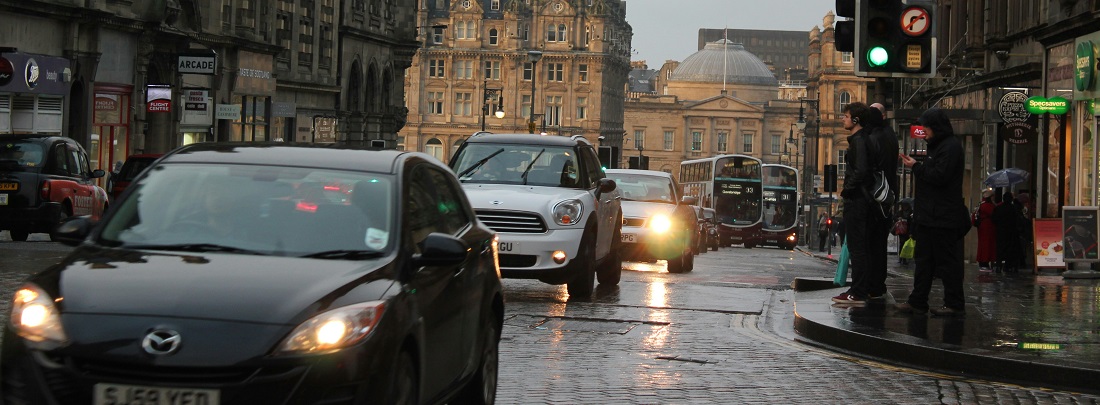Edinburgh is a beautiful city, rich with history and brimming with great places for expats to visit and explore. The city itself is quite compact, so it's relatively easy to get around on foot or bike. Do bear in mind though, it is quite hilly and many of the streets in the city centre have cobblestones which make cycling rather challenging.
Those who try to tackle the gradients will be rewarded with magnificent views all around. The city centre, aside from the rugged cobbled terrain, is certainly bicycle-friendly. Otherwise, bus and train services make getting around Edinburgh and surrounds easy and efficient.
Public transport in Edinburgh

Buses
Edinburgh has a 24-hour network of local bus services, allowing frequent and cost-effective travel. Buses arrive at 10- to 30-minute intervals during the day, with a reduced service after 7pm. Edinburgh's two major bus companies are Lothian Buses and First, both of which have a simple ticketing system with a single flat fare for all destinations.
Those looking to purchase tickets aboard the bus must ensure they have the correct fare, as bus drivers cannot give them change.
Trains
Though buses are the most common form of public transport in Edinburgh, there is also a train system. This is mostly used for intercity travel, linking Edinburgh with cities such as Aberdeen, Glasgow, and London. The main train station is Edinburgh Waverly. There is also a small commuter rail network that runs from east to west.
Trams
The tram in Edinburgh has a single route of 15 stops from the town centre to Edinburgh Airport. It leaves every five to eight minutes from Monday to Saturday. The service is less frequent on Sundays, with trams leaving every 12 to 15 minutes.
Useful links
- For information on bus schedules and routes, see Lothian Buses and First.
- ScotRail has more on train fares, routes, and schedules.
- Edinburgh Trams has more on the tram system.
Taxis in Edinburgh
Edinburgh has hundreds of black cabs that can be hailed on the street or booked in advance. Travelling by taxi is quite expensive and probably not necessary when surrounded by a network of buses in the city centre.
Ride-hailing applications such as Uber are also operational in Edinburgh, which may be a cheaper option.
Driving in Edinburgh

Owning a car in Edinburgh isn't necessary, and in some cases even cumbersome. Apart from the advantages of cheaper alternatives such as travelling by foot in this compact city or using the extensive bus service, there are also drawbacks to owning a car. These include parking tariffs (the city centre has several no-park zones, where the only alternative is using pricey parking garages), traffic, and other car-related costs such as insurance, maintenance, and fuel.
Expats who do wish to drive can do so legally for up to 12 months on a valid foreign licence. At this point, the foreign licence will need to be exchanged for a local licence. Nationals of EU and EEA countries can continue to drive using their foreign licence until it expires.
Read Transport and Driving in the UK to learn more about securing a local driving licence.
Further reading
►Read more about Transport and Driving in the United Kingdom
Photo credits: Bus in Edinburgh by Matthew Kalapuch; Driving in Edinburgh by Anthony Camp. Both sourced from Unsplash.
Are you an expat living in Edinburgh?
Expat Arrivals is looking for locals to contribute to this guide, and answer forum questions from others planning their move to Edinburgh. Please contact us if you'd like to contribute.
Expat Health Insurance
Cigna Global Health Insurance.
Medical insurance specifically designed for expats. With Cigna, you won't have to rely on foreign public health care systems, which may not meet your needs. Cigna allows you to speak to a doctor on demand, for consultations or instant advice, wherever you are in the world. They also offer full cancer care across all levels of cover, and settle the cost of treatments directly with the provider.
Moving Internationally?
International Movers. Get Quotes. Compare Prices.
Sirelo has a network of more than 500 international removal companies that can move your furniture and possessions to your new home. By filling in a form, you’ll get up to 5 quotes from recommended movers. This service is free of charge and will help you select an international moving company that suits your needs and budget.
Get your free no-obligation quotes from select removal companies now!


